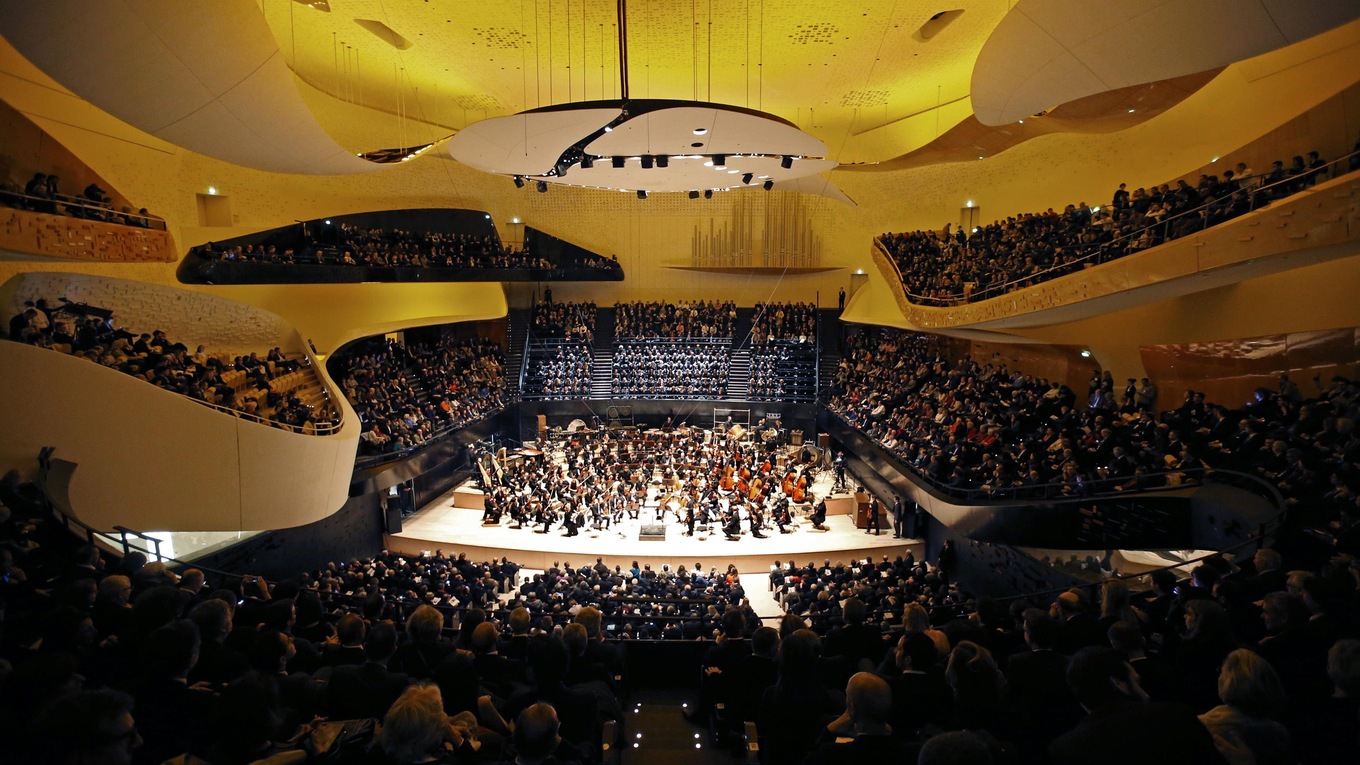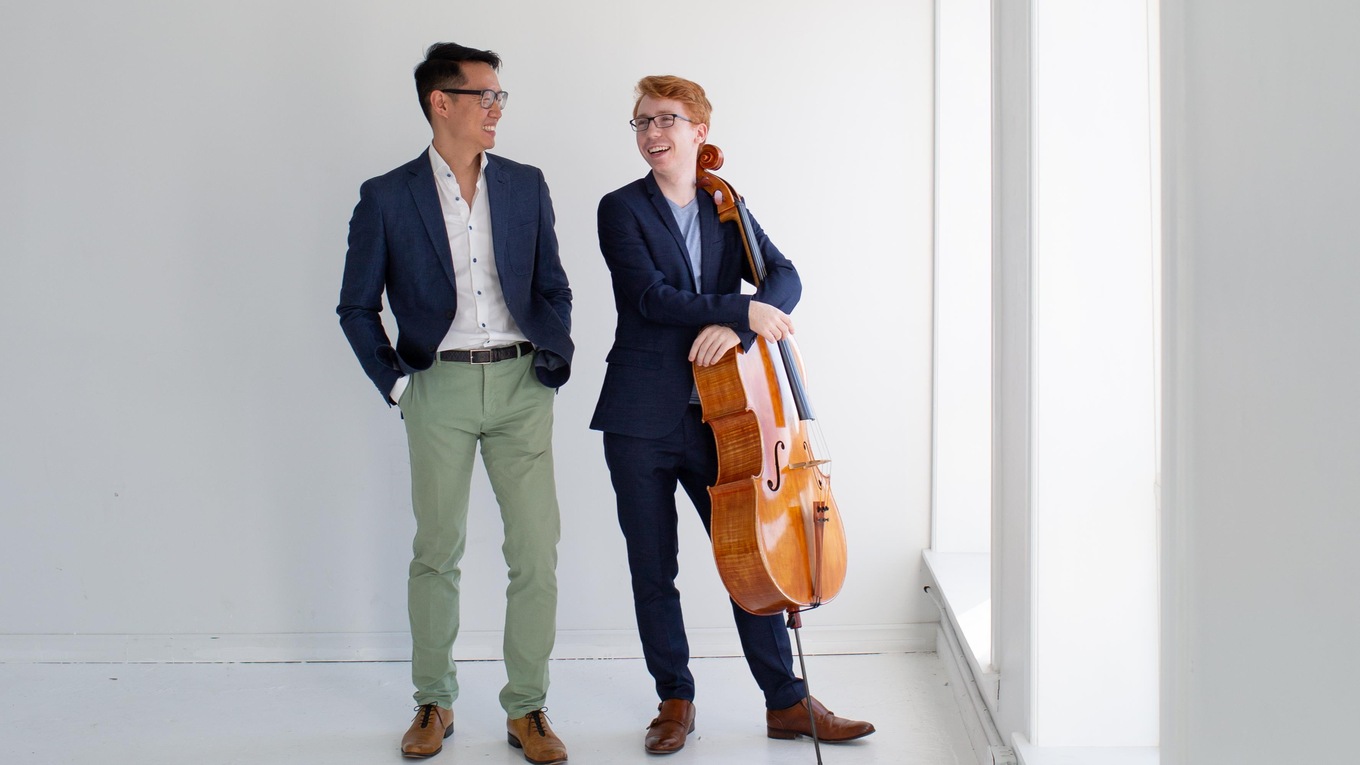"I never saw myself making a debut album that was anything but French music," muses Cameron Crozman, 23, over a cup of tea on a cold January afternoon in Montreal.
"When I was talking with my friends back in Paris, they said, ‘As French people, we can’t do that, because it’s cliché. But as a Canadian, you’re lucky: you understand the culture, and yet you’re not French, so you can allow yourself to do this French album.’"
The album in question is Cavatine, a collection of works for cello and piano by Debussy, Koechlin, Messiaen, Poulenc and Françaix, released Jan. 25 on ATMA Classique.
While Cavatine is Crozman's debut record, it's also the culmination of a lifelong (so far) fascination with all things French. Crozman did his primary and secondary school education in French, first in Calgary, where he was born, and then in London, Ont., where he moved at age 11. He felt an affinity for the language and at a tender age set a goal for himself to do his post-secondary studies at the Paris Conservatory.
As a teen in London, his cello studies accelerated under the private tutelage of Paul Pulford, cello professor at nearby Wilfrid Laurier University. Crozman was soon drawn to the Orford Arts Centre's summer academy in Quebec's Eastern Townships. There, in 2009, he met Michel Strauss, cello professor at the Paris Conservatory. Crozman and Strauss worked together over three consecutive summers at Orford, confirming Crozman's intention to move to Paris, which he finally did in 2012 at the age of 17.
'Ah, t'es pas d'ici, toi'
"I had built up this dream of Paris. Unfortunately there are few dreams that live up to reality," he reflects. "It was a hard experience at first, but because of that I really grew. In a strange way, I really learned what it was to be Canadian, living in Paris. People would always say, 'Ah, t’es pas d’ici, toi': you speak our language, but you’re not from here.
"I had this dream of Paris, but then you realize there’s all this administrative stuff to do — you have to go to the préfecture and get your visa stamped [eyerolls] — and it takes the romanticism out of it."
Nevertheless, he soon adjusted and ended up living in Paris for six years, completing undergraduate and master's degrees as well as an artist diploma at the Paris Conservatory. He was then selected for Gautier Capuçon's Class d'Excellence de Violoncelle at the Fondation Louis Vuitton.
"Over the six years, I found that dream again," he says.
'A pit in the ground'
As a student in Paris, Crozman got into the habit of practising from 9 a.m. to 2 p.m. on weekends. "Then I'd have lunch, followed by a visit to a museum or gallery," he recalls wistfully. During his third year there, the Philharmonie opened.
"When I arrived, it was a pit in the ground, and slowly you saw this thing emerge. The Philharmonie had an amazing subscription plan for youth under 26. You could get nine-euro concert tickets, and they were good seats. I think I bought a 20-concert subscription, because how often do you get to go to a brand new, world-class concert hall that’s two metro stops away, for nine euros?"
Crozman's first subscription began with the Philharmonie's opening concert, a performance of Fauré's Requiem given in response to the Charlie Hébdo shootings. "That was jam-packed," he recalls. "The president walks in — François Hollande — at a time when he was quite unpopular. I don’t think I’ve ever been to a concert [in Paris] where anyone gives a standing ovation, it’s just not in their culture, they don’t do that. So, François Hollande walks in and everyone stands up and you could tell there was special electricity in the air."

The Philharmonie replaced Salle Pleyel as Paris's prime venue for orchestral concerts. "Salle Pleyel was right near the 16th arrondissement, one of the wealthier areas of Paris, and so they were worried about having a new concert hall in a pretty sketchy area — that no one would come, that they’d lose audiences," Crozman explains. "But I can say, having gone to concerts there over three years, they basically sell out their concerts. For a house like that, which is 2,500 seats, it’s phenomenal. Not only did they get their old audience, but they got a whole new audience from that area, who never would have made their way out to Salle Pleyel."
In December, Crozman spent a few days in one of the Philharmonie's rehearsal halls recording Benjamin Britten's three suites for solo cello for a spring 2019 release. The project originated at the Festival Printemps des Arts de Monte-Carlo, where Crozman played a recital in 2018. "They started a label a couple of years back, to record some artists, so they asked me to do [the Britten Suites], which is great because they paid for everything! [laughs]"
'I'd want to play with this guy again'
Crozman's piano partner on Cavatine is Philip Chiu, whom he met several years ago in London, Ont., where Chiu also grew up. "You know how sometimes you just have that connection? I’d have a hard time believing anyone could play with him and not feel like, 'I’d want to play with this guy again,'" Crozman says.
"French music is something that Phil and I really love and the first piece we ever played together was the César Franck Sonata. It started there, and it’s really fitting that the album is also all-French."

In fact, Chiu played for Crozman's 2015 audition that secured him the three-year loan of the Bonjour Stradivari cello, c. 1696, from the Canada Council for the Arts' musical instrument bank. Valued at $12 million, it's named after Abel Bonjour, an amateur Parisian cellist who owned it in the late 19th century.
This instrument guided Crozman's choice of repertoire for Cavatine. "The Bonjour spent a lot of its history in Paris," he explains. "I keep meaning to go back and catalogue everything I learned about its history, but I’ve been too busy working on albums and stuff. We know that Bonjour purchased it in the 1860s, but I think it was there before that, too. I’m pretty sure it left Paris in the 1920s, so it spent a good, like, 60 to 80 years in Paris."
Crozman recorded his album on the Bonjour Strad before the term of his three-year loan ended last September. Watch him play Bach on it:
The Canada Council has now loaned Crozman the 1769 Johannes Guillami cello, a Spanish instrument.
"I’m really loving it, actually. Whereas with the Bonjour, we knew so much about it, the reality is that with many Spanish instruments, especially this one, we just don’t know that much. I do know that this one used to belong to Walter Joachim, who was here in Montreal, and so it does have a bit of Canadian history. But this cello is full of mysteries. It was cut down: it used to be a much larger instrument, like a small double bass, and because of this it has a really wonderful, rich, low-end sound."
"This cello comes from a really interesting point in history, when the Spanish empire was at its peak," he continues. "And I’ve been interested to learn about the Spanish empire and about how much of the world was actually 'controlled' by Spain. It went all the way up the west coast of Canada. And what used to be the state of Louisiana went all the way up into southern Alberta and Saskatchewan. Basically, every continent, or at least part of it, was 'controlled' by the Spanish.
"So, I’m interested to explore that part: What does having a string instrument from that point in history mean for what you’re able to do with it?"
We're interested to hear how Crozman answers that question in the months and years to come.
Stream Crozman and Chiu's new album, Cavatine, here.
Fans in Manitoba can hear Crozman play Dvorák's Cello Concerto with the Winnipeg Symphony Orchestra on Feb. 8, 9 and 10. Consult Crozman's complete concert schedule here.
Related:
Viola essentials: 10 pieces you should know
Gymnopédie No. 1: watch Jamie Parker play Satie
Watch Johannes Moser play excerpts from Bach's Cello Suite No. 1

From the court of King Louis XIV, and the stage of the Paris Opera Ballet to the musical salon of Nadia Boulanger: a musical trip through time.
Hear Rameau, Berlioz, Debussy, Ravel and more!
